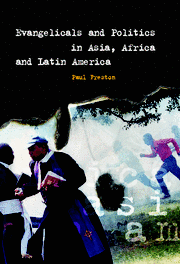Book contents
- Frontmatter
- Contents
- Foreword by David Martin
- Acknowledgements
- List of abbreviations
- Introduction
- PART ONE BRAZIL
- PART TWO ASIA
- PART THREE AFRICA
- 9 Sudan
- 10 Angola
- 11 Mozambique
- 12 Zimbabwe
- 13 Malawi
- 14 Rwanda
- 15 Uganda
- 16 Ghana
- 17 Kenya
- 18 Zambia
- 19 South Africa
- 20 Nigeria
- PART FOUR SPANISH-SPEAKING LATIN AMERICA
- Conclusion
- Bibliography
- Index
- Frontmatter
- Contents
- Foreword by David Martin
- Acknowledgements
- List of abbreviations
- Introduction
- PART ONE BRAZIL
- PART TWO ASIA
- PART THREE AFRICA
- 9 Sudan
- 10 Angola
- 11 Mozambique
- 12 Zimbabwe
- 13 Malawi
- 14 Rwanda
- 15 Uganda
- 16 Ghana
- 17 Kenya
- 18 Zambia
- 19 South Africa
- 20 Nigeria
- PART FOUR SPANISH-SPEAKING LATIN AMERICA
- Conclusion
- Bibliography
- Index
Summary
In Malawi, Ross (1955a, 1955b) says, Christianity and national identity grew up together. The arrival of Christianity predated Nyasaland as a political unit. In 1875, two Scottish missions were established: the Church of Scotland in Blantyre, in the south; and the Free Church of Scotland at Livingstonia, in the north. They thus preceded the British protectorate, which was lobbied for by the missions as the only way of preventing takeover by the Portuguese. The latter would be a disaster for the Scots' vision of a land set apart from white settlement (Portuguese or Rhodesian), a land of ‘Christianity and Commerce’. As one of their missionaries declared in 1895, ‘“Africa for the Africans” has been our policy from the first.’
Thus, says Ross, Malawi began as a product of the missionary imagination. In colonial Nyasaland, two large churches developed: the Church of Central Africa – Presbyterian (CCAP – a fusion of the Scottish missions and a Dutch Reformed mission) and the Catholic Church. The Presbyterians educated the emerging black elite and were often critical of colonial policy, while the Catholics were mostly rural and politically conformist. The nationalist movement was predominantly Presbyterian; of 1500 people detained in 1959, 1200 were of that church. In the first cabinet after independence, eight of the ten ministers were products of Presbyterian schools. The church was, in short, too close to the government to maintain its tradition of social witness.
- Type
- Chapter
- Information
- Evangelicals and Politics in Asia, Africa and Latin America , pp. 132 - 133Publisher: Cambridge University PressPrint publication year: 2001



